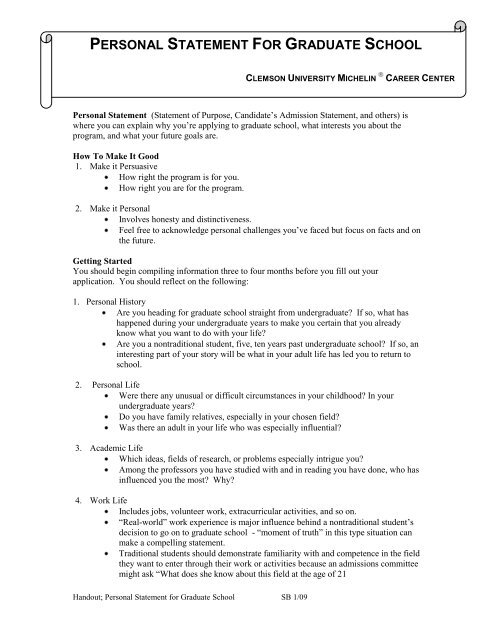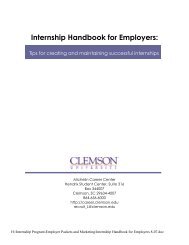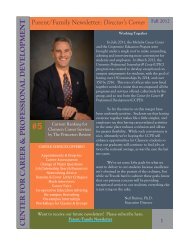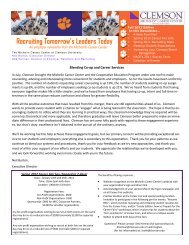Personal Statement - Michelin Career Center - Clemson University
Personal Statement - Michelin Career Center - Clemson University
Personal Statement - Michelin Career Center - Clemson University
Create successful ePaper yourself
Turn your PDF publications into a flip-book with our unique Google optimized e-Paper software.
PERSONAL STATEMENT FOR GRADUATE SCHOOL<br />
CLEMSON UNIVERSITY MICHELIN CAREER CENTER<br />
CAREER DEVELOPMENT AND OCCUPATIONAL INFORMATION<br />
<strong>Personal</strong> <strong>Statement</strong> (<strong>Statement</strong> of Purpose, Candidate’s Admission <strong>Statement</strong>, and others) is<br />
where you can explain why you’re applying to graduate school, what interests you about the<br />
program, and what your future goals are.<br />
How To Make It Good<br />
1. Make it Persuasive<br />
How right the program is for you.<br />
How right you are for the program.<br />
2. Make it <strong>Personal</strong><br />
Involves honesty and distinctiveness.<br />
Feel free to acknowledge personal challenges you’ve faced but focus on facts and on<br />
the future.<br />
Getting Started<br />
You should begin compiling information three to four months before you fill out your<br />
application. You should reflect on the following:<br />
1. <strong>Personal</strong> History<br />
Are you heading for graduate school straight from undergraduate? If so, what has<br />
happened during your undergraduate years to make you certain that you already<br />
know what you want to do with your life?<br />
Are you a nontraditional student, five, ten years past undergraduate school? If so, an<br />
interesting part of your story will be what in your adult life has led you to return to<br />
school.<br />
2. <strong>Personal</strong> Life<br />
Were there any unusual or difficult circumstances in your childhood? In your<br />
undergraduate years?<br />
Do you have family relatives, especially in your chosen field?<br />
Was there an adult in your life who was especially influential?<br />
3. Academic Life<br />
Which ideas, fields of research, or problems especially intrigue you?<br />
Among the professors you have studied with and in reading you have done, who has<br />
influenced you the most? Why?<br />
4. Work Life<br />
Includes jobs, volunteer work, extracurricular activities, and so on.<br />
“Real-world” work experience is major influence behind a nontraditional student’s<br />
decision to go on to graduate school - “moment of truth” in this type situation can<br />
make a compelling statement.<br />
Traditional students should demonstrate familiarity with and competence in the field<br />
they want to enter through their work or activities because an admissions committee<br />
might ask “What does she know about this field at the age of 21<br />
Handout; <strong>Personal</strong> <strong>Statement</strong> for Graduate School SB 1/09
Writing a Draft<br />
After doing preliminary “research”, pick your story and write a personal statement draft.<br />
Don’t edit or worry about the length, just WRITE.<br />
Next, put your draft away for at least 2 weeks – don’t even look at it!<br />
At this point, it is more constructive to focus on what the essay shouldn’t be than what it should<br />
be. Here are some essay approaches that usually don’t work out:<br />
1. Funny<br />
Very few people can do funny so for the most part play it straight.<br />
2. Maudlin<br />
It is fine to acknowledge the role personal difficulties have played in your decisions about<br />
graduate school but keep the emotion to a minimum and focus on the facts and the future.<br />
3. Iconoclastic<br />
There is a persistent rumor that unusual, even outrageous, responses to a personal<br />
statement will get the admission’s committee’s attention and it will but it is almost<br />
always negative attention.<br />
4. Exhaustive Life History<br />
Don’t try to be comprehensive or strictly chronological and avoid beginning statements<br />
such as “As a child, I…” or “Such and such has always been my passion…”<br />
You don’t have to prove that you were born to your field of interest, in fact your story<br />
may be more intriguing if it shows how you were not born to a field but came to it<br />
through life experiences.<br />
5. The Resume<br />
Since you are free to attach a copy of your resume or CV to all graduate school<br />
applications, there is no need to waste your essay space by recounting your work history.<br />
If your statement is about how your work experiences have led you to apply, then keep<br />
the focus on the why and the how, not on the what of your work and your job history.<br />
Next Steps<br />
When you are satisfied that you are on the right track, do some editing. Also, get some feedback<br />
from a couple of people you know well. Some questions to consider are: is the essay coherent,<br />
does it reflect your story as they understand it, and most of all does the essay make them say,<br />
“yeah, that’s you.”<br />
At this point, you should look at the essay more closely. Now it is time to focus on what the<br />
essay is.<br />
1. Stress Unique Material<br />
Use the essay to talk about something that doesn’t come up anywhere else on your<br />
application, you want to give the admissions committee something new to think about.<br />
2. Concentrate On One Theme<br />
“What led me to apply to this program,” “The person who has most influenced my<br />
thinking,” and so on.<br />
3. Show, Don’t Tell<br />
Admissions committee has no reason to believe any general statement that you make<br />
about yourself unless you back it up with facts and evidence – that is what makes it<br />
persuasive.<br />
4. Tell Why, Not What<br />
Use your essay space to explain why an event was significant to you and what you<br />
learned from it – provide enough background so that your reader can follow what’s<br />
happening, but no more.<br />
Handout; <strong>Personal</strong> <strong>Statement</strong> for Graduate School SB 1/09
5. Extracurricular Activities<br />
All that interests the admissions committee is the depth of your involvement in your field,<br />
play up these activities on your application – don’t load up on unrelated information. This<br />
will be considered irrelevant and at worst, may make you look scattered and unfocused.<br />
The Most Common MISTAKES Applicants Make When Writing a <strong>Personal</strong> <strong>Statement</strong><br />
1. Sloppiness<br />
Avoid formatting, and grammatical errors by carefully proofreading your work. Leave<br />
adequate time to edit your writing.<br />
2. Writing One General <strong>Statement</strong> for all Schools<br />
Be specific as to why each particular school interests you and how you will contribute to<br />
the program. Read each school’s instructions and be sure to follow the guidelines for<br />
their essays.<br />
3. Boring Content<br />
Have a positive tone, vary the length and structure of your sentences, and use precise<br />
language. Avoid numerical lists, clichés, and chronological histories.<br />
4. Sounding Like Everyone Else<br />
In your preliminary self-assessment, identify your strengths and decide what sets you<br />
apart from other applicants. Communicate that uniqueness in your personal statement –<br />
what motivates you, what are your plans for the future, etc.<br />
5. Being Shy<br />
Write with confidence about your intellectual development – what events or ideas have<br />
most influenced you, how have you changed intellectually as a result, etc<br />
6. Writing What You Think Someone Else Wants to Read<br />
Don’t do this if what you write doesn’t truly reflect who you are. Enrolling in a program<br />
that isn’t truly suited for you will only make you uncomfortable later and decrease your<br />
chance of success.<br />
7. Dwelling on Crises<br />
The explanation of crises and misfortune are essential if they affected personal and<br />
academic development and perspective. A superficial mention that doesn’t provide the<br />
reader with insight is useless and too much disaster and destruction also reflects<br />
negatively.<br />
8. Failing to Check Spelling and Grammar Carefully<br />
9. Appearing Unrealistic<br />
When discussing goals and plans, make sure that they and the related timetables are<br />
feasible.<br />
10. Spinning Irrelevant Yarns<br />
Make absolutely certain that whatever you decide to reveal about yourself and your life<br />
addresses the question asked.<br />
Please refer to Kaplan Graduate School, Admissions Advisor, Graduate Admissions Essays, and<br />
other materials that are available in the <strong>Career</strong> Resource Library, for more information and<br />
sample essays.<br />
Handout; <strong>Personal</strong> <strong>Statement</strong> for Graduate School SB 1/09
Handout; <strong>Personal</strong> <strong>Statement</strong> for Graduate School SB 1/09








